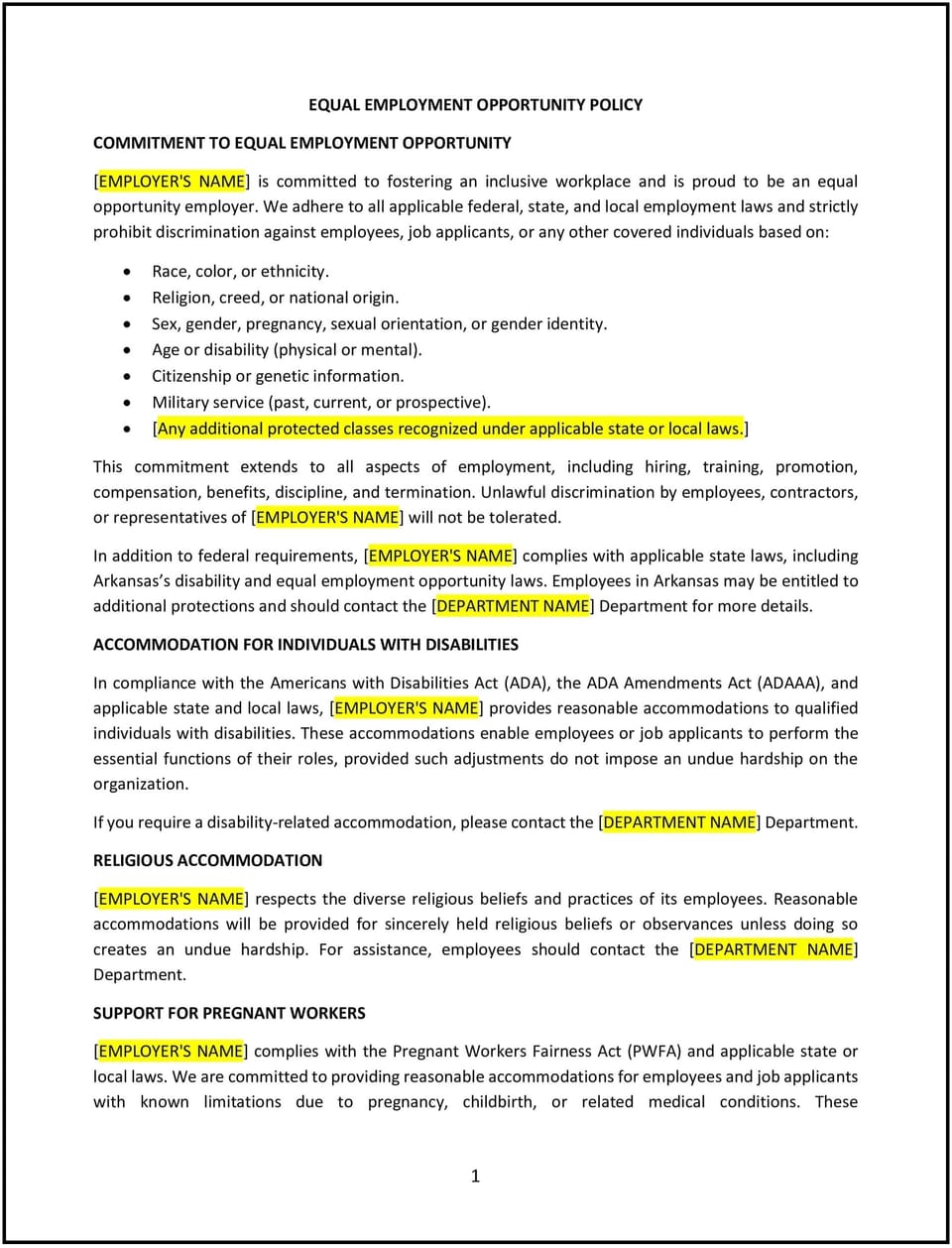Equal opportunity employment policy (Arkansas): Free template

Equal opportunity employment policy (Arkansas)
In Arkansas, an equal opportunity employment (EOE) policy outlines a business’s commitment to providing fair and non-discriminatory employment practices. This policy ensures that all employment decisions are based on qualifications, merit, and business needs, free from discrimination based on protected characteristics.
This policy supports compliance with federal and state anti-discrimination laws, including the Civil Rights Act, the Americans with Disabilities Act (ADA), and Arkansas-specific regulations. By implementing this policy, Arkansas businesses can foster an inclusive workplace, reduce legal risks, and enhance employee trust.
How to use this equal opportunity employment policy (Arkansas)
- Define equal opportunity principles: Clearly state the business’s commitment to fairness in hiring, promotion, training, and other employment decisions.
- Align with legal standards: Specify adherence to Arkansas and federal laws, such as the ADA and the Equal Pay Act, to ensure compliance.
- Communicate expectations: Ensure employees understand the policy and their responsibilities in fostering a respectful and inclusive workplace.
- Establish reporting procedures: Provide clear steps for employees to report any concerns or violations of the policy, including contact points within HR or management.
- Enforce consistently: Apply the policy uniformly across all employees and applicants to maintain fairness and transparency.
Benefits of using this equal opportunity employment policy (Arkansas)
This policy offers several advantages for Arkansas businesses. Here’s how it helps:
- Promotes inclusivity: Encourages diversity in the workplace by eliminating barriers to equal opportunity.
- Enhances employee trust: Demonstrates the business’s commitment to fairness, fostering a positive workplace culture.
- Reduces legal risks: Ensures compliance with Arkansas anti-discrimination laws and federal regulations, minimizing the risk of lawsuits or penalties.
- Attracts top talent: Builds a reputation as an equitable employer, appealing to a broader and more diverse talent pool.
- Strengthens workplace morale: Promotes mutual respect among employees by fostering an environment of fairness and equality.
Tips for using this equal opportunity employment policy (Arkansas)
- Address Arkansas-specific considerations: Incorporate state anti-discrimination laws and guidelines into the policy.
- Train employees: Provide training on diversity, equity, and inclusion (DEI) principles, as well as recognizing and preventing workplace discrimination.
- Monitor compliance: Regularly review hiring and promotion practices to ensure alignment with the policy and legal standards.
- Encourage feedback: Create an open environment where employees feel comfortable sharing concerns or suggestions related to workplace inclusivity.
- Review and update: Update the policy periodically to reflect changes in Arkansas laws, business practices, or workforce needs.
Q: How does this policy benefit the business?
A: This policy fosters an inclusive workplace, reduces legal risks, and enhances the business’s reputation by ensuring fair and equitable employment practices.
Q: What employment practices are covered under this policy?
A: The policy applies to hiring, promotions, training, compensation, and other employment-related decisions, ensuring they are free from discrimination.
Q: How does this policy support compliance with Arkansas laws?
A: The policy aligns with state anti-discrimination laws and federal regulations, ensuring the business meets its legal obligations while promoting fairness.
Q: How should employees report violations of this policy?
A: Employees should report concerns or violations through designated channels, such as HR or a trusted manager, as outlined in the policy.
Q: How should the business ensure the policy is enforced consistently?
A: The business should ensure consistent enforcement by training managers, monitoring employment practices, and maintaining open communication with employees.
This article contains general legal information and does not contain legal advice. Cobrief is not a law firm or a substitute for an attorney or law firm. The law is complex and changes often. For legal advice, please ask a lawyer.


